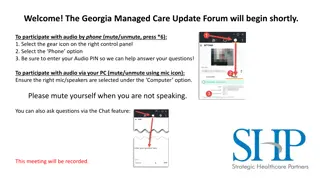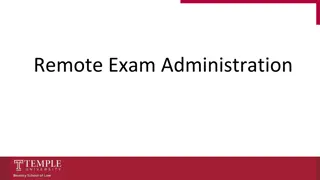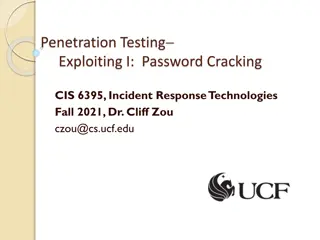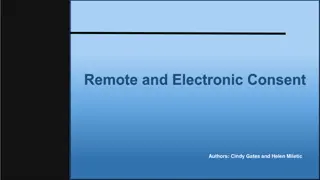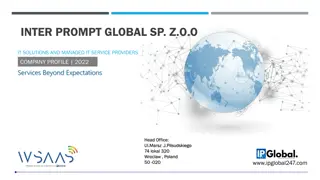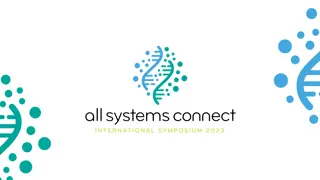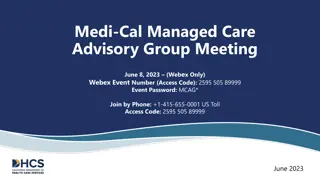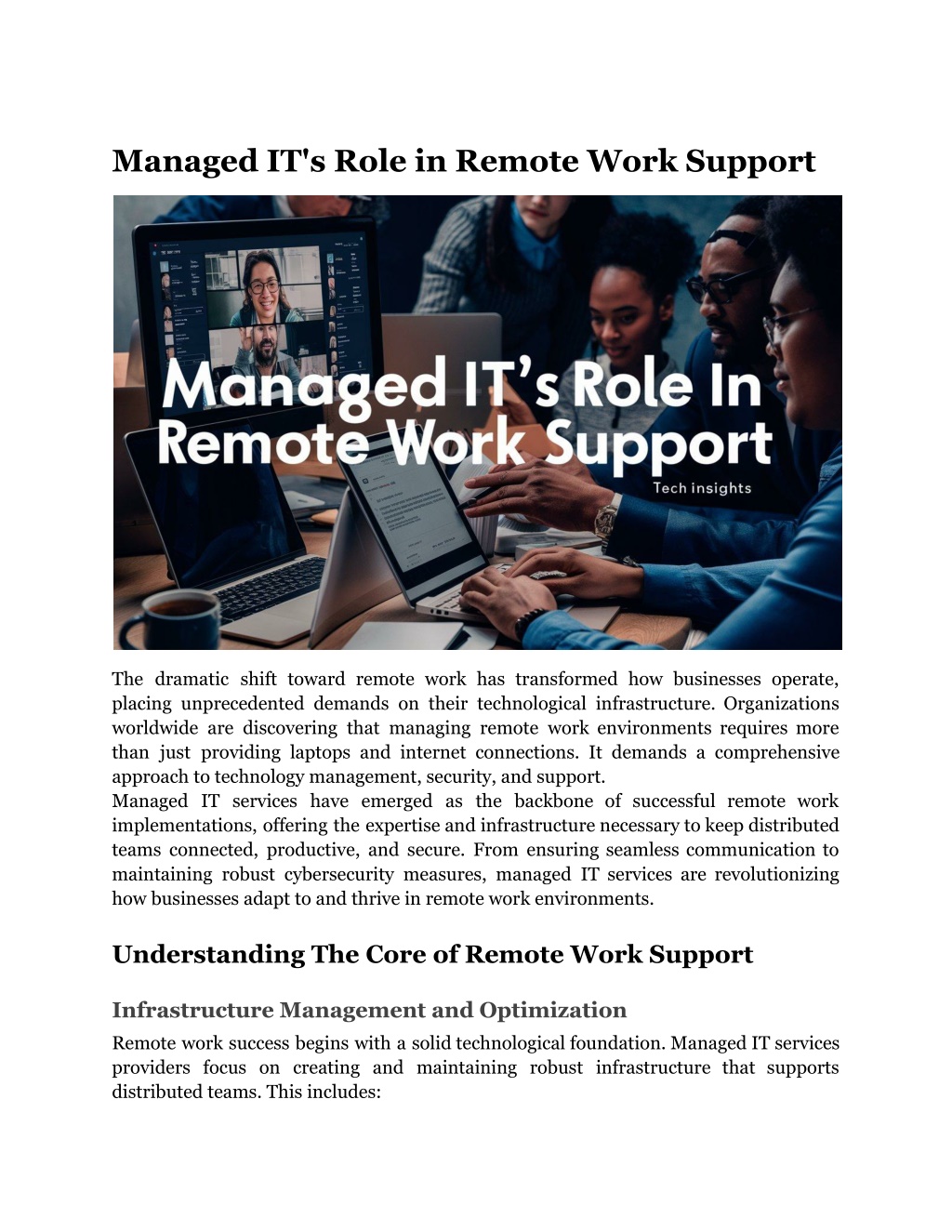
Managed IT's Role in Remote Work Support
Explore how managed IT services enhance remote work by providing secure, efficient solutions for seamless team collaboration and productivity.n
Download Presentation

Please find below an Image/Link to download the presentation.
The content on the website is provided AS IS for your information and personal use only. It may not be sold, licensed, or shared on other websites without obtaining consent from the author. Download presentation by click this link. If you encounter any issues during the download, it is possible that the publisher has removed the file from their server.
E N D
Presentation Transcript
Managed IT's Role in Remote Work Support The dramatic shift toward remote work has transformed how businesses operate, placing unprecedented demands on their technological infrastructure. Organizations worldwide are discovering that managing remote work environments requires more than just providing laptops and internet connections. It demands a comprehensive approach to technology management, security, and support. Managed IT services have emerged as the backbone of successful remote work implementations, offering the expertise and infrastructure necessary to keep distributed teams connected, productive, and secure. From ensuring seamless communication to maintaining robust cybersecurity measures, managed IT services are revolutionizing how businesses adapt to and thrive in remote work environments. Understanding The Core of Remote Work Support Infrastructure Management and Optimization Remote work success begins with a solid technological foundation. Managed IT services providers focus on creating and maintaining robust infrastructure that supports distributed teams. This includes:
Network architecture design Cloud service implementation Performance monitoring and optimization Bandwidth management System redundancy planning The key to effective infrastructure management lies in proactive monitoring and maintenance. Professional IT teams continuously assess system performance, identify potential bottlenecks, and implement solutions before problems arise. Secure Access Implementation Security remains paramount in remote work environments. Managed IT services deploy comprehensive security measures that protect company assets while enabling seamless access for authorized users. This involves: Multi-factor authentication systems Virtual Private Networks (VPNs) Zero-trust security frameworks Access control management Regular security audits Enhanced Communication and Collaboration Solutions Unified Communications Platforms Remote work depends heavily on reliable communication tools. Managed IT services ensure the seamless integration and operation of: Video conferencing systems Team messaging platforms Project management tools Document sharing solutions Cloud-based collaboration software These platforms must work together harmoniously, requiring expert configuration and ongoing maintenance to maintain optimal performance. Cloud Services Management Cloud services form the backbone of remote work capabilities. Managed IT services handle: Cloud infrastructure setup Application deployment Storage management Performance optimization
Cost monitoring and optimization Cybersecurity in Remote Environments Comprehensive Security Frameworks Remote work environments face unique security challenges. Managed IT services implement multi-layered security approaches including: Advanced endpoint protection Email security solutions Web filtering Data encryption Security awareness training Threat Detection and Response Proactive security measures include: 24/7 monitoring Real-time threat detection Incident response planning Regular vulnerability assessments Security patch management IT Support for Remote Teams Help Desk Services Remote workers need reliable technical support. Managed IT services provide: 24/7 help desk availability Multi-channel support options Remote troubleshooting capabilities Self-service knowledge bases Automated ticket tracking Device Management Managing remote devices requires specialized attention: Hardware procurement and deployment Software installation and updates Device security configuration Remote monitoring and maintenance End-of-life management
Data Management and Business Continuity Backup and Recovery Solutions Data protection becomes more critical in remote environments. Services include: Automated backup systems Cloud-based storage solutions Data recovery planning Regular backup testing Compliance monitoring Disaster Recovery Planning Business continuity requires comprehensive planning: System redundancy Failover testing Emergency response procedures Regular plan updates Staff training Specialized IT Service Toronto Solutions When considering managed IT services in the Greater Toronto Area, businesses benefit from providers who understand local business environments and compliance requirements. IT support experts in Toronto offer specialized knowledge of regional regulations and business practices, ensuring organizations receive support tailored to their specific needs. This local expertise becomes particularly valuable when implementing remote work solutions that must comply with Canadian data privacy laws and industry regulations. Regional Infrastructure Advantages These providers typically maintain robust infrastructure within the region, offering better response times and more reliable support for Toronto-based organizations. Their proximity allows for faster on-site support when necessary, even in predominantly remote work environments. Cost Management and Scalability
Budget Optimization Managed IT services help organizations optimize their technology spending through: Predictable monthly costs Reduced capital expenditures Efficient resource allocation Technology lifecycle management ROI monitoring Scalable Solutions As organizations grow and change, their IT needs evolve: Flexible service levels On-demand resource scaling Quick deployment capabilities Adaptable support models Future-proof technology planning Remote Work Security Best Practices Employee Training and Awareness Security awareness becomes crucial in remote environments: Regular security training sessions Phishing awareness programs Password management education Security policy compliance Incident reporting procedures Policy Implementation Clear policies guide remote work security: Acceptable use guidelines Data handling procedures Device management policies Access control standards Incident response protocols
Performance Monitoring and Optimization System Performance Tracking Continuous monitoring ensures optimal performance: Network speed monitoring Application performance tracking User experience assessment Resource utilization analysis Performance trend analysis Optimization Strategies Regular optimization maintains system efficiency: Network traffic management Resource allocation adjustment Application performance tuning Storage optimization Bandwidth management The second instance of IT Service Toronto providers demonstrates their crucial role in implementing these monitoring and optimization organizations operating in the Greater environment. strategies, Area's particularly competitive for Toronto business Conclusion Managed IT services have become indispensable in supporting remote work environments, providing the expertise, infrastructure, and security necessary for successful distributed operations. By offering comprehensive support across all aspects of remote work technology, these services enable organizations to maintain productivity, security, and collaboration regardless of physical location. Site Article: Managed IT's Role in Remote Work Support

